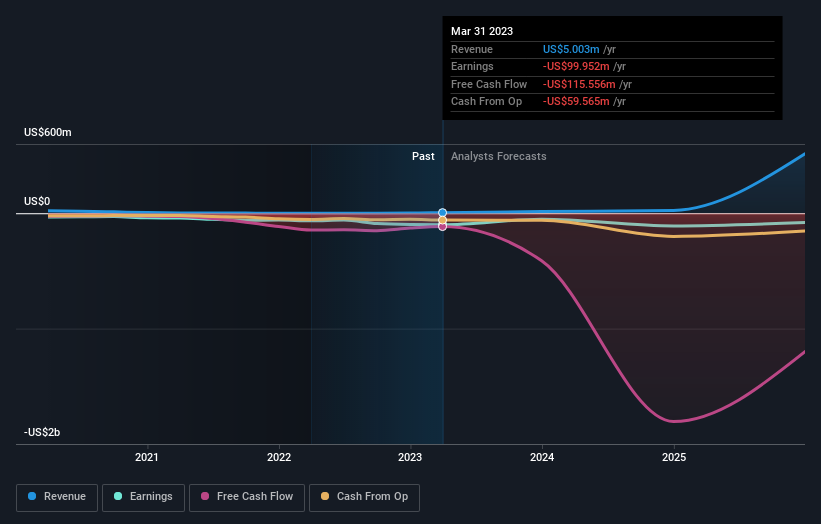Institutions profited after Gevo, Inc.'s (NASDAQ:GEVO) market cap rose US$83m last week butretail investors profited the most
Key Insights
Gevo's significant retail investors ownership suggests that the key decisions are influenced by shareholders from the larger public
A total of 25 investors have a majority stake in the company with 43% ownership
A look at the shareholders of Gevo, Inc. (NASDAQ:GEVO) can tell us which group is most powerful. The group holding the most number of shares in the company, around 50% to be precise, is retail investors. Put another way, the group faces the maximum upside potential (or downside risk).
Retail investors gained the most after market cap touched US$341m last week, while institutions who own 46% also benefitted.
Let's take a closer look to see what the different types of shareholders can tell us about Gevo.
See our latest analysis for Gevo
What Does The Institutional Ownership Tell Us About Gevo?
Institutions typically measure themselves against a benchmark when reporting to their own investors, so they often become more enthusiastic about a stock once it's included in a major index. We would expect most companies to have some institutions on the register, especially if they are growing.
As you can see, institutional investors have a fair amount of stake in Gevo. This suggests some credibility amongst professional investors. But we can't rely on that fact alone since institutions make bad investments sometimes, just like everyone does. If multiple institutions change their view on a stock at the same time, you could see the share price drop fast. It's therefore worth looking at Gevo's earnings history below. Of course, the future is what really matters.
Gevo is not owned by hedge funds. BlackRock, Inc. is currently the largest shareholder, with 12% of shares outstanding. With 7.4% and 5.9% of the shares outstanding respectively, State Street Global Advisors, Inc. and The Vanguard Group, Inc. are the second and third largest shareholders. Additionally, the company's CEO Patrick Gruber directly holds 1.1% of the total shares outstanding.
On studying our ownership data, we found that 25 of the top shareholders collectively own less than 50% of the share register, implying that no single individual has a majority interest.
Researching institutional ownership is a good way to gauge and filter a stock's expected performance. The same can be achieved by studying analyst sentiments. Quite a few analysts cover the stock, so you could look into forecast growth quite easily.
Insider Ownership Of Gevo
The definition of an insider can differ slightly between different countries, but members of the board of directors always count. Company management run the business, but the CEO will answer to the board, even if he or she is a member of it.
Insider ownership is positive when it signals leadership are thinking like the true owners of the company. However, high insider ownership can also give immense power to a small group within the company. This can be negative in some circumstances.
We can report that insiders do own shares in Gevo, Inc.. In their own names, insiders own US$11m worth of stock in the US$341m company. It is good to see some investment by insiders, but it might be worth checking if those insiders have been buying.
General Public Ownership
The general public -- including retail investors -- own 50% of Gevo. This level of ownership gives investors from the wider public some power to sway key policy decisions such as board composition, executive compensation, and the dividend payout ratio.
Next Steps:
I find it very interesting to look at who exactly owns a company. But to truly gain insight, we need to consider other information, too. To that end, you should learn about the 4 warning signs we've spotted with Gevo (including 1 which makes us a bit uncomfortable) .
If you would prefer discover what analysts are predicting in terms of future growth, do not miss this free report on analyst forecasts.
NB: Figures in this article are calculated using data from the last twelve months, which refer to the 12-month period ending on the last date of the month the financial statement is dated. This may not be consistent with full year annual report figures.
Have feedback on this article? Concerned about the content? Get in touch with us directly. Alternatively, email editorial-team (at) simplywallst.com.
This article by Simply Wall St is general in nature. We provide commentary based on historical data and analyst forecasts only using an unbiased methodology and our articles are not intended to be financial advice. It does not constitute a recommendation to buy or sell any stock, and does not take account of your objectives, or your financial situation. We aim to bring you long-term focused analysis driven by fundamental data. Note that our analysis may not factor in the latest price-sensitive company announcements or qualitative material. Simply Wall St has no position in any stocks mentioned.
Join A Paid User Research Session
You’ll receive a US$30 Amazon Gift card for 1 hour of your time while helping us build better investing tools for the individual investors like yourself. Sign up here


